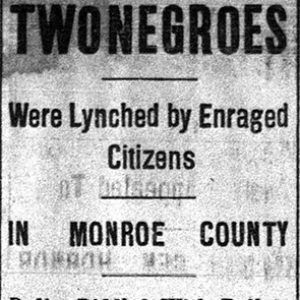calsfoundation@cals.org
G. W. and Moses Ricks (Lynching of)
In June 1898, prosperous African-American farmer G. W. Ricks and his son, Rev. Moses Ricks, were lynched in southern Monroe County for the alleged assault of a white farmer’s wife. According to historian Terence Finegan, whose A Deed so Accursed is a study of lynching in South Carolina and Mississippi, prosperous African Americans were occasionally lynched because their success threatened the notion of white superiority.
Census information both illuminates and confuses the story. In 1870, there was a black farmer named Jim Ricks living in Monroe County’s Duncan Township. He was twenty-seven years old, and living with him were his wife, Miriam, and several other family members, all of them too old to be the Rickses’ children. Ricks was a farmer; he owned no real estate, but his personal estate was valued at $300. The 1880 federal census also shows a Ricks family living in Duncan Township. This record is hard to decipher, and although the names of the adults are given as Denas and Malan, Denas’s name could easily be interpreted as James. Living with them were six children and Malan’s daughter by a former marriage. Among the children was nine-year-old Moses. James Ricks and most of his children could read and write; Malan (Miriam) could not. There is no explanation for the discrepancy in names between the James Ricks of the census and the G. W. Ricks listed in newspaper reports.
By 1898, published accounts described the elder Ricks as “one of the most prominent colored men in Monroe County.” His son, Moses, was described by the Arkansas Gazette as a “fairly well educated” preacher and “religious exhorter, well known among the members of his race in this vicinity.” He was twenty-five years old and was to be ordained as a minister on June 18, 1898.
On June 15, the Arkansas Gazette published two articles about the case. According to the first, Moses Ricks and his father were accused of attacking the wife of a white farmer; her name was being withheld. The elder Ricks was hanged on Sunday night, June 12. His son, Moses, was hanged the following evening. According to this first report, the father was suspected of being the main perpetrator of the crime, but he confessed and then accused his son of being the main culprit. Moses Ricks also confessed, was identified by the victim, and “was quickly disposed of by her avengers.” There was “great excitement among the negroes over the double lynching and while some of them are getting out of the neighborhood in terror others are showing an ugly temper that portends further trouble.”
Appended to this is a second account in the Gazette, which gives more information about the “fiendish crime.” Moses and his father were accused of going to the farmer’s house on Friday, June 10. Finding only the wife at home, Moses allegedly “seized her and after choking her into insensibility outraged her.” He was arrested the next day, and a preliminary trial was held before a justice of the peace. Some 300 citizens attended the trial and threatened to lynch Ricks, but no action was taken until Monday, June 13, when a mob took him from officers and presented him to his victim, who identified him.
He was taken to a nearby wooded area, where he allegedly confessed. He was then lynched, and his body, “perforated with Winchester bullets, was left dangling in the air with placards printed on the clothing as a warning to other negroes.” This second account makes no mention of the elder Ricks’s lynching. These stories were then published in several newspapers across the country, including the New York Evening Telegram and the Daily Public Ledger of Maysville, Kentucky.
According to the census, Moses Ricks’s mother apparently remained in Monroe County. In 1900, Miriam Rix (Ricks) was living alone on a rented farm in Duncan Township. Her only other son, King S. Ricks, was no longer living in the county. No record could be found of any of her daughters marrying there. She is not listed in the 1910 census.
For additional information:
“Another Account.” Arkansas Gazette, June 15, 1898, p. 2.
“Lynched.” Daily Public Ledger (Maysville, Kentucky), June 15, 1898, p. 3.
“Munster and His Father Lynched.” New York Evening Telegram, June 15, 1898, p. 9. Available online at http://fultonhistory.com/Newspapers%206/New%20York%20
NY%20Evening%20Telegram/New%20York%20NY%20Evening%20Telegram%201898%20Jun%20-%20Oct%20Grayscale/New%20York%20NY%20Evening%20Telegram%201898%20Jun%20-%20Oct%20Grayscale%20-%200115.pdf (accessed September 14, 2021).
“Two Negroes Were Lynched by Enraged Citizens.” Arkansas Gazette, June 15, 1898, p. 2.
Nancy Snell Griffith
Clinton, South Carolina
 Civil Rights and Social Change
Civil Rights and Social Change Post-Reconstruction through the Gilded Age, 1875 through 1900
Post-Reconstruction through the Gilded Age, 1875 through 1900 Ricks Lynching Article
Ricks Lynching Article 



Comments
No comments on this entry yet.